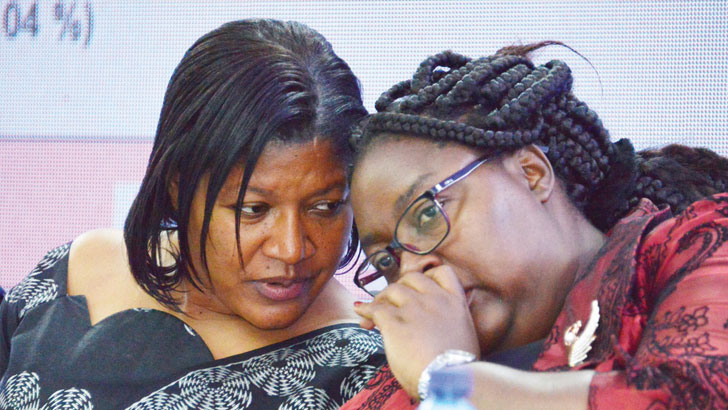Court faults APM on MEC
High Court Judge Kenyatta Nyirenda has described the conduct of former president Peter Mutharika in the appointment of the 2020 cohort of electoral commissioners as full of “impunity” and has
since fired appointees sponsored by DPP.
Delivering judgement in a case where Malawi Congress Party (MCP) secretary general Eisenhower Mkaka sued the country’s President demanding removal of four Malawi Electoral Commission (MEC) commissioners sponsored by former governing Democratic Progressive Party (DPP), the judge observed that Mutharika, as the appointing authority, deliberately flouted the law by tilting the balance of power in the commission in favour of his party.
He said DPP and the then opposition MCP were supposed to have equal representation in the commission at three each; hence, the appointment of Jean
Mathanga, Linda Kunje, Steven Duwa and Arthur Nanthuru on a DPP ticket was void.

Nyirenda said: “It doesn’t take rocket science to note that the interested parties [concerned commissioners] were not duly appointed.”
Mutharika a ppointed the current cohort of MEC commissioners chaired by High Court Judge Chifundo Kachale on June 7 2020 ahead of the court-sanctioned fresh presidential election held on June 23.
The election followed the nullification of the May 21 2019
presidential election results on February 3 2020 by a five-judge panel of the High Court of Malawi sitting as the Constitutional Court and the decision was upheld by a seven-judge panel of the Malawi Supreme Court of Appeal on May 8.
In his ruling, Nyirenda provided direction on the composition of MEC, saying as it stands only two commissioners sponsored by MCP, namely Anthony Mukumbwa and Olivia Liwewe were duly appointed. In this regard, he asked DPP to submit names of three nominees to be considered for its slots
in the commission while MCP should provide one.
The judge also clarified that the firing of the four commissioners does not in any way affect the decisions they have undertaken during their tenure, including management of the fresh presidential election and several by-elections.
The court also ordered that the name of the previous MCP nominee Richard Chapweteka, whom Mutharika ignored in his appointment of the commissioners, be resubmitted to President Lazarus Chakwera for action.
Whe n contacted yesterday, Nanthuru, a lawyer by profession, asked for more time to study the report before responding to questions.
“I haven’t yet read the ruling. It will be better to make a comment when I have read it,” he said.
His three colleagues— Kunje, Mathanga and Duwa—could not be reached for comments. But Kunje posted on her Facebook page “ndautalikitsa, bakambiranani”, literally meaning people were free to discuss her status while she had started off.
DPP spokesperson Brown Mpinganjira was not available for the party’s reaction.
Earlier when Chakwera withdrew the appointment of Mathanga and Kunje based on the recommendation of the Constitutional Court and Supreme Court tasking Parliament’s Public Appointments Committee to assess their competence in the previous MEC cohort, Attorney General Chikosa Silungwe advised MEC that the development meant the Commission was non-existent.
Yesterday, Silungwe asked for more time to study the judgement.
But Malawi Law Society (MLS) said the judgement has affected the decision-making powers of the commission as the remaining members cannot form a quorum.
In a written response, MLS honorary secretary Chrispin Ngunde said: “With this High Court judgement, the Electoral Commission cannot make valid decisions. Unlike in the recent past when only two commissioners were affected, the new development has wider implications because not only is there a vacancy, but also inadequate quorum.”
Section 75 (1) of the Constitution provides that the Electoral Commission shall consist of a judge and other such members not being less than six.
On the other hand, Section 11(3) of the Electoral Commission Act provides that the quorum at every meeting of the commission shall be 51 percent of the members of the commission.
In his reaction, private practice lawyer Khumbo Bonzoe Soko said the law envisaged a situation where there will always be the electoral body; hence, the judgement does not render MEC non-existent, especially with the chairperson and two commissioners still in office.
He said: “What it means, however, is that the commission has now been robbed of a quorum. While it can carry executing activities on the basis of resolutions previously made, it will struggle to deal with issues that will emerge.
“I see challenges for instance in managing the by-election. The other oddity though would be that the commission would perhaps not even have the capacity currently to call the election off!”
MEC spokesperson Sangwani Mwafulirwa yesterday said the commission will wait for direction from the Attorney General on the matter.
MEC is scheduled to hold parliamentary and local government by-elections on June 29 while in August it will embark on a boundary redemarcation exercise for wards and constituencies.
On the other hand, Mkaka was in court during the reading of the ruling and immediately hailed it as “justice delivered”.
On costs, the judge ruled that each party to the case pays its legal team





